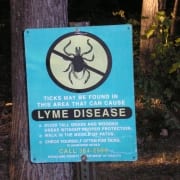“I Think I’m Losing My Mind”: When Treating Tick-Borne Illness Feels Worse Before It Gets Better
She’s 23. Bright, motivated, kind and always eager to smile. She came to our office after years of searching for answers to her fatigue, body aches, temperature swings, and lightheadedness that started without warning.
Testing eventually revealed she was dealing with Babesia, one of the lesser-known but highly impactful tick-borne co-infections. We started a targeted treatment plan that included antimicrobials, detox support, acupuncture and mitochondrial nutrients. In the first few weeks, she felt hopeful, after having an occipital nerve block done, her headaches were less frequent, she had less body pain and her energy had started to return.
But then something changed.
When she was weeks into her protocol, her mom called the office one Monday morning, worried. Her daughter had become withdrawn, anxious and couldn’t sleep.. She said she felt “like I’m going crazy”. Her heart raced at night. She had dark, intrusive thoughts that made no sense to her. And worst of all, she had stopped her medication without checking in because she felt like she just couldn’t swallow anymore pills—afraid that the treatment was making her worse.
It’s a story we hear often.
What Was Happening?
The medications to kill the parasitic Babesia caused an overall inflammatory response of the brain.
She wasn’t losing her mind. The process of die-off reaction can trigger a wave of inflammation and neurotoxicity—especially in sensitive patients or when infections like Babesia are involved.
Babesia in particular is a red blood cell parasite that releases pro-inflammatory molecules, affects oxygen delivery, and can trigger severe mood and neurologic symptoms. Inflammatory cytokines can cross the blood-brain barrier, activating microglia (the brain’s immune cells) and producing symptoms like:
- Panic and paranoia
- Intrusive or obsessive thoughts
- Nightmares and air hunger
- Brain fog, rage, or emotional volatility
These are not just mental health concerns—they’re signs of neuroinflammation. And they are treatable—with the right tools and support.
What Helped Her?
Luckily, her family saw changes and brought her back in. She cried when we explained what was happening—but this time, with relief. She wasn’t broken. Her brain was inflamed, and her nervous system was overwhelmed by the die-off. We sat down together and made a plan:
- Paused medications for a few days to let the inflammation calm down
- Restarted treatment at a lower dose, with pulsing to avoid overload
- Burbur and pinella drops in water to help detox
- Continuing her glutathione and binders to support detox
- Doing an IV with glutathione in the clinic to help detox her body faster
- Encouraged her to take her magnesium, L-theanine, and omega-3s to support her brain
- Encouraged gentle movement, hydration with electrolyte drinks, acupuncture, salt baths and infrared sauna
But most importantly—we agreed that she would not stop treatment without calling us first. Because when you’re navigating a complex illness, especially one that hides in the nervous system, staying connected to your care team is as important as any prescription.
The Takeaway
Communication is the key to successful treatment…. Don’t assume it means you’re regressing—or broken. It may be a signal that your body is fighting hard—and just needs help navigating the process. Pause. Reach out. Let’s reassess and adjust the plan.
Tick-borne illnesses can affect every part of us—the body, the brain, the mood, and the spirit. But with the right support, healing is possible. And more often than not, you are far stronger and more resilient than you realize.
We are here for you, and we want to help.
Our goal is to return you to optimal health as soon as possible. To schedule an appointment please call: 703-532-4892 x2











Leave a Reply
Want to join the discussion?Feel free to contribute!